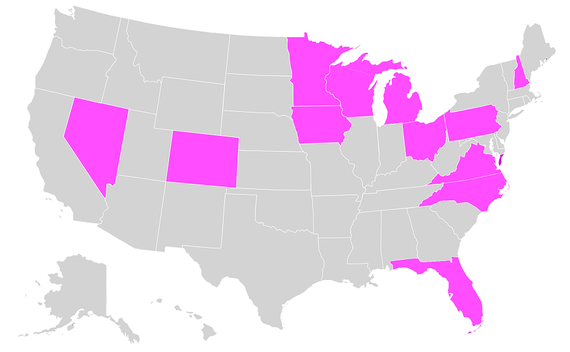There has been much scuttlebutt this election season about how the primary process isn't democratic enough and how it's "rigged" to benefit establishment figures over insurgents. Here's the hard truth:
Primaries are rigged by design.
They are setup this way because the only objective of a political party is to have their nominee win the national election, full stop. As a result, the major national parties do leverage some democracy to make the process somewhat representative, but ultimately, primaries on both sides are setup to empower state delegates to nominate candidates.
Introducing Swing State Super-Weighting
Given that the parties' primaries are designed exclusively to find the strongest general election candidate, it is arguable that the political parties should take this to its logical end and further rig the primary process to add additional delegate weight to the electoral college swing states (i.e., FL, NC, VA, OH, etc.). Implementing swing state super-weighting would help ensure that a party's nominee has proven to perform the best in the most important states in the general election.
To help make this point, ask yourself these questions:
- Is a Democrat winning Oklahoma over other Democrats in the primary really going to help predict general election performance?
- Will a Republican winning a California primary over other Republican candidates show any kind of real general election strength?
Looking through a strictly analytical (and non-democratic) lens, primary performance in "base states" for each respective party seems trivial at best, and a distraction at worst. Case in point: Donald Trump's recent clobbering of his opponents in New York seems to have re-invigorated his campaign, yet practically, Trump will not win New York's electoral college votes in the general election, so it should have much less bearing on the Republican nomination process.
Replacing Bad Rigging with Better Rigging
As a result of the historic success of Bernie Sanders' insurgent candidacy, the Democratic Party has been put on the defensive with regards to superdelegates because these insider delegates symbolize the least representative aspect of their primary system. The Democrats would benefit far greater (from both a primary effectiveness and PR perspective) by replacing superdelegates with swing state super-weighting of delegates. Instead of party insiders picking the winner before the primary process even begins, candidates would earn additional party support based on how they actually performed in the most important states during the primary process.
Republicans do not have superdelegates (although it's a safe bet that a lot of party managers wish they had them now!), but they have all sorts of other non-democratic systems to help ensure that their candidate is the most likely to win the general election: winner-takes-all state primaries, state conventions, post-election horse trading, and more. These all reek of thumb-on-the-scale maneuvers that Donald Trump has exploited in a PR offensive that has begun to tarnish the Republican party brand. Changing to swing state super-weighting would have the same positive effect it would have for the Democrats: it would better identify the candidate most likely to win the general election while being more transparent and obvious as to why and how the system is undemocratically rigged.
Replacing Primary Rigging with Democracy Introduces New Problems
Another school of thought is that primaries should be more democratic and less driven by party managers tipping the scales in favor of electability. This approach could work as well, but it would require heavy regulations applied to the national parties, ensuring that they play by the same rules so that the process were truly democratic. For example, currently, primaries happen in a sequence, state by state, giving certain states more voting weight than others. This is not democratic at all, yet we accept it because we're used to it, but we've also bought into the idea that limiting voting to a small set of early states helps ensure that candidates of all levels of financial resources can afford to get their message out to the people, and fairly compete with candidates with much larger resources.
Yes, the "free market" system that the political parties enjoy now does favor establishment candidates, but a fair and completely democratic national primary process would have, for example, enabled only Donald Trump and Jeb Bush to be viable Republican candidates, and would have completely shut out a viable Bernie Sanders candidacy. In addition, any kind of regulation applied to political parties may unintentionally lock out new political parties looking to gain a foothold in our body politic.
Repeal and Replace the Rigging
Despite how rigged the current process is, it has some under-appreciated features that many critics take for granted. But that doesn't mean we can't rig it better. Both parties should consider scrapping their existing sloppy and parochial rigging systems and replace them with a more effective, transparent and easier-to-justify system like the swing state super-weighting approach..
There is no perfect system, but a rigged primary system that favors swing state performance will make more sense to voters -- and it will actually work better for political parties -- than the current rigged system. This win/win prescription may be just what the doctor ordered for angry voters and struggling political parties.

